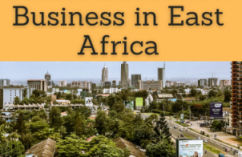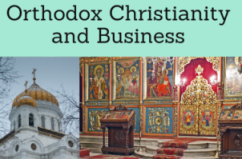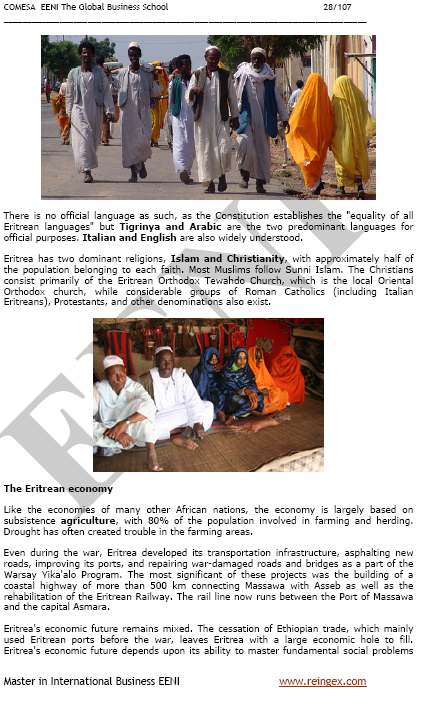Business in Eritrea, Asmara

ritrean Economy and Foreign Trade: textiles, meat, beer, shoes, ceramics
- Introduction to the State of Eritrea (East Africa)
- Business in Asmara
- Eritrean Economy
- International Trade of Eritrea
- Access to the Eritrean Market
- Business Plan for Eritrea
The objectives of the subject “International Trade and Business in the State of Eritrea” are the following:
- To analyze the Eritrean Economy and Global Trade
- To know the trade opportunities in Eritrea
- To explore the Eritrean trade relations with the country of the student
- To know the Eritrean Free Trade Agreements

The Subject “Foreign Trade and Business in Eritrea” belongs to the following Online Programs taught by EENI Global Business School:
Doctorate in African Business, World Trade.
Master in Business in Africa, Transport in Africa, International Business, Foreign Trade, International Transport.

EENI Partnerships with Educational Institutions
Languages:  or
or  Erythree
Erythree  Eritrea
Eritrea  Eritreia.
Eritreia.
Credits of the subject “Doing Business in Eritrea”:
1 

 Masters adapted to Eritrean Students.
Masters adapted to Eritrean Students.
International Trade and Business in Eritrea.
Eritrea: an economy based on a subsistence agriculture. Textiles and clothing exporter.


Eritrean Trade Agreements and Preferential Access:
- Eritrea and the East African Economic Area
- Intergovernmental Authority on Development (IGAD)
- Common Market for Eastern and Southern Africa (COMESA)
- COMESA-EAC-SADC Agreement
- African Continental Free-Trade Area
- Community of Sahel-Saharan States (CEN-SAD)
- Eritrea-U.S.
- AGOA (U.S.)
- Eritrea and the COMESA-United States Agreement
- Eritrea-EU
- Nile Basin Initiative (NBI) - observer country

- WTO
- GATS
- Agreement on Sanitary Measures
- Agreement on Technical Barriers to Trade
- Agreement on Preshipment Inspection
- Agreement on Safeguards
- Trade Facilitation Agreement
- WCO
- BIC (Containers)
- Chicago Convention (ICAO)
- IMO
- Istanbul Convention
- Customs Convention on Containers - not a member

African Trade and Economic Organizations. The State of Eritrea is a member of:
- Economic Commission for Africa
- African Union
- AU Convention on Preventing and Combating Corruption (not signed)
- AUDA-NEPAD
- African Development Bank
- Africa-India Cooperation
- Africa-BRICS
- Africa-Turkey Partnership
- Afro-Arab Cooperation
- BADEA
- Africa-Asia Partnership
- Forum on China-Africa Cooperation

- UN
- WB
- WTO
- IMF
- Arab League - Observer State
State of Eritrea
- Asmara is the capital of the State of Eritrea (579,000 people)
- Eritrea does not have an official language (“equality of all Eritrean languages”)
- Tigrinya (2.5 million) is the most spoken language
- Work and trade languages are Tigrinya, Arabic and English
- The Borders of Eritrea are Sudan, Ethiopia, and Djibouti
- Eritrean Population: 5 million people
- Eritrean Area: 121,320 km²
- The state of Eritrea became independent from Ethiopia in 1993
- Government of Eritrea: one-party presidential unitary republic
- Currency of Eritrea: Nakfa (ERN)
More information about Eritrea (EENI African Business Portal).
Religions in Eritrea:


Eritrea belongs to the East African Economic Area.
- The economy of the State of Eritrea (Africa) is mostly based on a subsistence agriculture (80% of the Eritrean population is implicated in farming and herding)
- Textiles and clothing, processed meat, beer, shoes, and ceramics are the largest industrial products of Eritrea
- The main Eritrean mineral resources are granite, marble, silver, copper, gold, and zinc
Global Trade and Business in Eritrea:


(c) EENI Global Business School (1995-2024)
We do not use cookies
Top of this page



